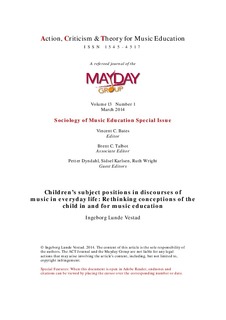Children's subject positions in discourses of music in everyday life: Rethinking conceptions of the child in and for music education.
Journal article, Peer reviewed

Åpne
Permanent lenke
http://hdl.handle.net/11250/276990Utgivelsesdato
2014Metadata
Vis full innførselSamlinger
Originalversjon
Vestad, I. L. (2014). Children's subject positions in discourses of music in everyday life: Rethinking conceptions of the child in and for music education. Action, criticism, & theory for music education, 13(1), 248-278.Sammendrag
In this article I discuss children’s everyday uses of recorded music (such as CDs, Mp3-files) in the light of sociological notions of “children” and “childhood”. The discussion provides perspectives on musical engagement and musicality that supplement perspectives within developmental psychology. The study is based on observations and interviews with 3- to 6-year-old children, kindergarten staff and parents, situated in two kindergartens and nine family homes. The results show that two contradictory narratives of children’s musicality are available simultaneously; the everybody-can narrative and the only-the-talented-can narrative. The subject positions made available by these narratives are challenging because they create a split between enjoying music (a pleasurable natural capacity) and learning to play an instrument (burdensome work). I argue that the subject position “musicker” would work as a better alternative, because this position encompasses both playing an instrument and enjoying it.
Beskrivelse
This is an Open Access article originally published in the journal Action, criticism, & theory for music education. The article can be accessed at the following location: http://act.maydaygroup.org/articles/Vestad13_1.pdf
Utgiver
MayDay GroupTidsskrift
Action, criticism & theory for music educationBeslektede innførsler
Viser innførsler beslektet ved tittel, forfatter og emneord.
-
Knowing music as representation or as operation: Exploring musical diversity through collaborative music making in Kaleidoscope
Kvaal, Camilla (Peer reviewed; Journal article, 2021)A society considered to be in a multicultural condition is likely to condition the way things are seen and what is seen as important. Attention is likely to be drawn to difference and diversity and the prospects of including ... -
Pop Music for Kids: Sonic Markers as Narrative Strategies in Children’s Music
Askerøi, Eirik (Journal article; Peer reviewed, 2017)Whilst the creative handling of recording technology has played a major role in the development of popular music, there has been little research into the role of production in music promoted explicitly for a child audience. ... -
Strengthening friendship and pursuing artist dreams by informal musical practices: Musical agency in a cross-cultural context
Strøm, Irene Trønnes (Peer reviewed; Journal article, 2020)This article builds upon an ethnographic study of how young people growing up in cross-cultural contexts perform their musical agency (Strøm, 2016). The twofold focus of the article concerns the ways in which the pop duo ...